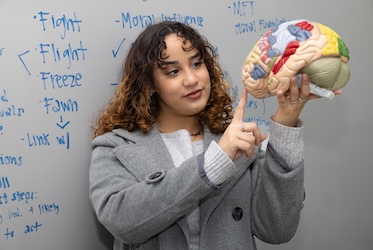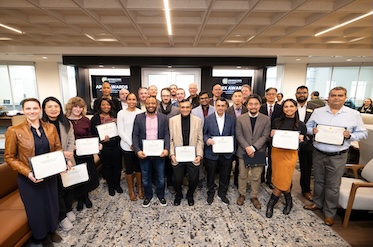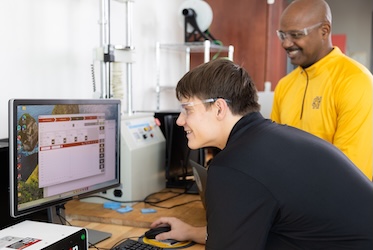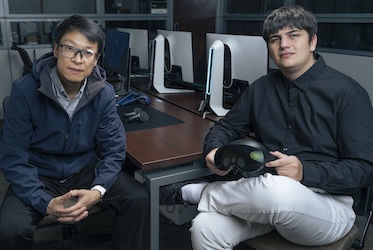

KENNESAW, Ga. | Feb 12, 2025
The benefits of undergraduate research are many: improved critical thinking, better writing and public speaking, and it makes graduates more competitive in the job market.
The Office of Undergraduate Research at Kennesaw State University sponsors several programs that allow undergraduate students to obtain these skills, such as the First-Year Scholars Program, Sophomore Scholars Program, Summer Undergraduate Research Program, and others.
However, the number of spots in these programs is finite, and there are some students who might not have time to engage in extracurricular activities.
To address these challenges and make undergraduate research more inclusive, KSU is embedding research experiences into courses through course-based undergraduate research experiences (CURE).
“By embedding research into courses, more students gain valuable research experience compared to the traditional undergraduate research experiences,” said Amy Buddie, director of undergraduate research. “CUREs are also beneficial for students who can't carve out time for extracurricular research experiences.”
Buddie received a grant in 2022 from the National Science Foundation’s program, Improving Undergraduate STEM Education (NSF-IUSE), which appropriates funding for research on Course-based Undergraduate Research Experiences (CURE).
One of the grant’s main goals is to develop a strategic plan for CUREs in STEM disciplines at KSU.
Associate Professor of Chemistry Rajnish Singh converted Culture of Science and Math (SCM 2000) into a CURE and offered two semesters of the course — one in the fall of 2023 and the other in the fall of 2024 — seeing massive growth in her students.
“SCM 2000 is a part of a learning community, so there are many different versions of it being offered,” Singh said. “When I compared the grades of the students who participated in the CURE section to those who had not, the difference was fantastic.”
SCM 2000 offers a welcoming environment for freshmen where they can learn to thrive in a STEM major. But by adding the CURE element to the class, students receive necessary hands-on undergraduate research experience in their first year of college.
“We teach them about the resources on campus; we have external speakers come in and talk to them,” Singh said. “Essentially, it’s just giving them all of the tools that could help them be successful in a STEM field.”
Singh turned one of her advanced biochemistry courses into a CURE and was shocked at how abundant the class was in seniors who had no experience in undergraduate research.
“A lot of students are shy in a lab they don’t know,” Singh said. “They don’t know if they can do it, and they don’t know how to approach faculty members; it can be very daunting for them.”
Undergraduate research is a great addition to a student’s resume and CV (curriculum vitae), and research experience is required by many employers in STEM fields. By offering more opportunities for incoming students, more students will be job ready upon their graduation.
CUREs are one of many options for getting involved in undergraduate research for both students and faculty.
“Faculty who would like to offer a CURE should tell their department chair or assistant/associate chair so that the course can be tagged as ‘undergraduate research’ in Banner,” Buddie said.
At the end of the CURE, faculty have their students write critical reflections about their experiences which are then evaluated by the Center for Excellence in Teaching and Learning (CETL) as well as Buddie as a part of her NSF grant.
The OUR provides some support and resources for faculty including:
– Story by Alyssa Ozment

Kennesaw State student explores how trauma affects decision-making

Top researchers recognized for achievements at Apex Awards

Kennesaw State team innovates stronger 3D-printed structures through advanced simulations

Student, faculty researchers explore how AI can improve STEM learning through virtual reality
A leader in innovative teaching and learning, Kennesaw State University offers undergraduate, graduate, and doctoral degrees to its more than 51,000 students. Kennesaw State is a member of the University System of Georgia with 11 academic colleges. The university's vibrant campus culture, diverse population, strong global ties, and entrepreneurial spirit draw students from throughout the country and the world. Kennesaw State is a Carnegie-designated doctoral research institution (R2), placing it among an elite group of only 8 percent of U.S. colleges and universities with an R1 or R2 status. For more information, visit kennesaw.edu.